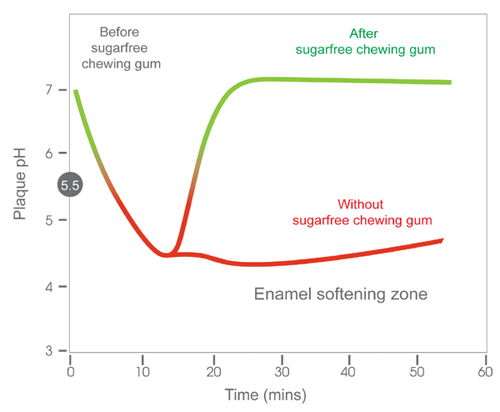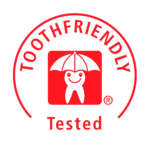Other Articles,
Chewing Gum: The facts
By Buttercup 7 Day Dental 25th Jan 2017
We get a lot of clients asking about chewing gum, and whether it’s helpful or harmful to your dental health. Hence this blog post.
So here it is: our chewing gum ‘fun’ facts.
#1 More saliva
Chewing gum helps produce more saliva, this is a good thing! Saliva is your body’s natural defence against tooth decay
The increased saliva flow is enormously advantageous, helping with everything from reducing the risk of cavities to bad breath.
— Barry Cockroft, MyDentist
#2 Acid protection
Your teeth are more at risk of acid attacks right after you have eaten. However, if you chew gum after a meal, you’ll speed up the process of replacing the minerals that protect the enamel. Chewing gum helps prevent cavities by removing food particles from the surface of your teeth.
Take a look at this handy diagram from DentalHealth which shows how long it takes to return to a normal pH level (how acidic something is) with sugar-free chewing gum and without sugar-free gum.

#3 Replace sugary snacks
If the office is stuffed with tasty pastries and the vending machines pose an eternal temptation, keeping a pack of gum in your pocket might be a good idea! It’s low cal and doesn’t have the damaging effect on your teeth that most treats do — it’s a win-win!
#4 It doesn’t replace brushing!
Contrary to what your teenage self might think, chewing gum should not be used as a replacement for normal dental care. You still need to brush your teeth twice a day and see your dentist regularly!
#5 Chew, chew and chew again (but not too much)
Yes, it’s called chewing gum but that doesn’t mean you should settle in for a full day chewing session. Be careful that you are not chewing too hard and too long as overuse can be harmful to your jaws. Also watch out that you’re not grinding your teeth as that’s an easy way to wear them down.
#6 Less cavities (maybe)
 Many sugar-free chewing gums contain xylitol, a natural sweetener which has shown to reduce cavities.
Many sugar-free chewing gums contain xylitol, a natural sweetener which has shown to reduce cavities.
While sugar-free products carry a ‘tooth friendly’ stamp in Europe and the US, the British Dental Journal has held back. Studies have shown that while chewing gum does decrease dental cavities, it may bring dental erosion if the gum contains acidic flavouring.
So, for the meantime, chewing gum may or may not actually keep your teeth healthy. (Sorry, we know that’s not very helpful!)
#7 Turn back bad breath
Bad breath is often caused by a lack of saliva. When you chew gum, you produce more saliva, reducing the nasty odours. If you’re super committed to eliminating halitosis, drink plenty of water and keep some gum handy.
#8 Cancel out that coffee
Despite how it looks when someone can’t stop chewing, a piece of gum can be incredibly refreshing after you’ve had a cup of coffee.
What next?
Overall we reckon that gum is like most things — there’s a correct time and place. Getting a minty boost after your lunch break is not only refreshing but can have a positive effect on the state of your teeth.
As long as you remember that different kinds of dental care shouldn’t be mutually exclusive, chew away!
Not been to the dentist for a while? Book an appointment online with us today
Similar Posts
How To Keep The Tooth Fairy Happy: Dental Tips For Kids
By Buttercup 7 Day Dental • 23rd Jan 2018
Glasgow’s Premier Dental Practices: Finding the Best
By Hannah Kemp • 01st Apr 2024


